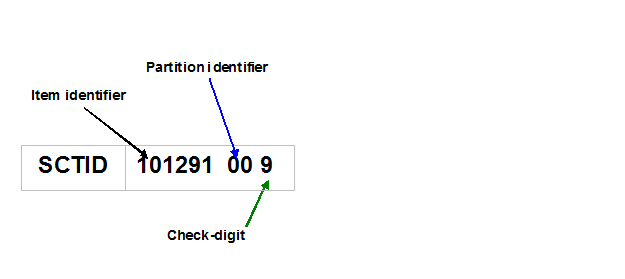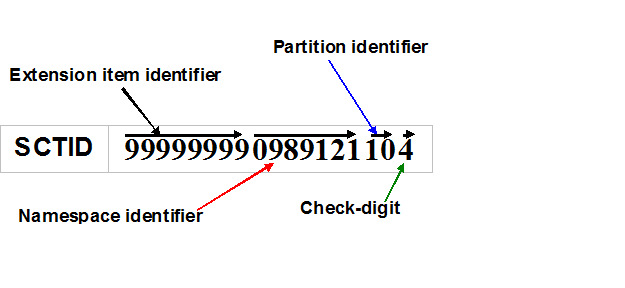Each SCTID (data type) identifies a
| Gloss |
|---|
| Space | true |
|---|
| t | SNOMED CT component. |
|---|
|
The identifier itself does not contain information related to the meaning of a
or
This means it is not possible to infer anything about the meaning of a
from the numeric value of the identifier or from the sequence of digits in that form of the identifer. The meaning of a
can be determined from
to other
and from associated
that include human readable terms.
The SCTID (data type) does however have a structure which includes valuable information about the nature and source of the identified component and the validity of the identifier. This structure supports the following features:
- validation of the identifier.
The
is the final digit in the decimal rendering of the identifier. This can be checked to minimize errors from transcription or incomplete copy-paste actions.
Partitioning between identifiers for different types of
A two-digit
| Gloss |
|---|
| Space | true |
|---|
| t | partition-identifier |
|---|
|
distinguishes the identifiers of different component types and prevents the same identifier from being allocated to both a and a As a result, when an SCTID (data type) is read from a record or other resource, it is possible to determine whether it represents a a or a before searching for the identified component.
Namespaces to separate component identifiers originated by different organizations.
 Figure 1. SCTID Short Format - Applicable to components originating from the International Release
Figure 1. SCTID Short Format - Applicable to components originating from the International Release
 Figure 2. SCTID Long Format - Applicable to components originating from a SNOMED CT Extension
Figure 2. SCTID Long Format - Applicable to components originating from a SNOMED CT Extension
| Info |
|---|
The | Gloss |
|---|
| Space | true |
|---|
| t | SNOMED International |
|---|
|
allocates | Gloss |
|---|
| Space | true |
|---|
| t | namespace-identifiers |
|---|
|
to organizations such as and to enable them to create content and or derivatives in an The | Gloss |
|---|
| Space | true |
|---|
| t | namespace-identifiers |
|---|
|
enables unique SCTID (data type) to be issued by many organizations and allow each SCTID (data type) to be traced to an authorized originating organization. |
...

